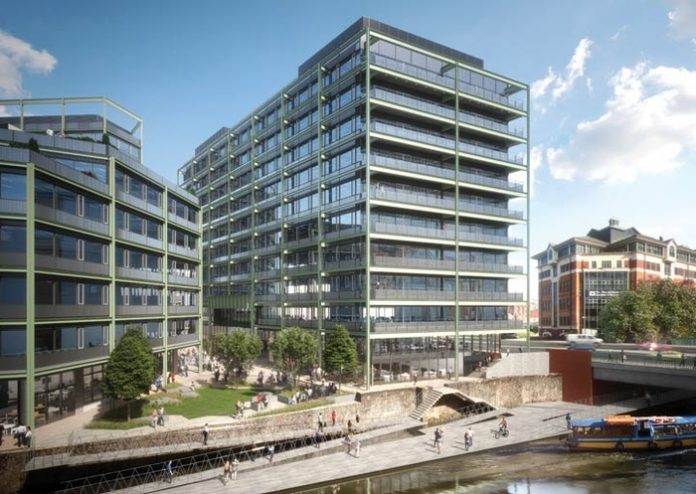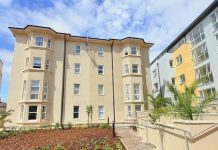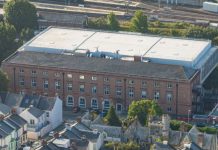
2019 was an extremely strong year for Bristol’s office market, end of year take-up exceeded both 2018 and the long term annual average by around 30%, totalling at an impressive 694,000 sq ft. This was driven by an exceptional fourth quarter in which 332,000 sq ft of office space was signed for, including Bristol’s largest ever office letting.
Telecommunications giant BT signed for the whole of the Assembly building, the 200,000 sq ft development is currently under construction and due to complete in the fourth quarter of 2020. Savills acted on behalf of AXA and Bell Hammer securing the largest ever office letting in Bristol. BT have a large presence in the South West and contribute over £1.3bn to the region’s economy.
It is therefore unsurprising that TMT was the most active business sector in the Bristol office market during 2019. TMT accounted for 46% of take-up, significantly up on the average proportion of around 20%. Other active sectors included Serviced Offices and Insurance & Financial Services, which accounted for 19% and 14% of take-up, respectively.
Supply remains extremely limited with just 540,000 sq ft available and of that just 120,000 sq ft is considered to meet Grade A standards. The addition of The Distillery, which is due to complete in the second quarter of the year, has added a much needed 90,000 sq ft to Bristol’s supply schedule.
However, with no further completions until 2022 occupiers looking within Bristol will likely have to consider pre-let opportunities for significant requirements. Nevertheless, occupiers looking to the development pipeline will have to act quickly as significant interest is seeing opportunity quickly diminish.
Limited Grade A availability has seen top rents in Bristol sky-rocket and during the third quarter of 2019, a record rent of £37.50 per sq ft was achieved at Grade A refurbishment ‘22-24 Queens Square’. This has secured Bristol the highest top rent in the big six regional office markets, comfortably above next in line Manchester where rents sit at £36.50 per sq ft. Savills expects top rents in Bristol city centre to continue increasing with £40.00 per sq ft on the horizon.
BRISTOL’S SERVICED OFFICE BOOM
During 2019 Bristol city centre saw more serviced office deals than any other big six regional office market, totalling 132,000 sq ft. The sector has shown significant growth with take-up increasing by over 300% since 2018. The popularity of serviced offices in Bristol has also seen desk prices rise significantly experiencing rental growth of 8% since 2018. Average desk prices in Bristol are currently £325 per month offering a 7% discount to Birmingham and level with Manchester. We expect that demand for serviced offices in Bristol will continue throughout 2020, although limited supply will restrict opportunities for the sector
Landlords in Bristol have reacted to this increased demand, which has ensured competition. Along with providing their own serviced space, alongside traditional leases, landlords are also adapting by offering incentives which mirror the services flexible offices provide. Throughout 2019, Bristol has seen an increasing number of office lettings where the incentives have included a category B fit out, allowing tenants to personalise and move into their office with minimal disruption.
But what is it about Bristol’s office market that makes it so compatible with the serviced office sector? It can be argued that this is, in part, due to Bristol’s vibrant tech sector which hosts and attracts a number of ‘cool’ occupiers who prefer to be in less traditional and more distinctive office space. It also likely that Bristol’s under-supply of Grade A space has increased the popularity of refurbishments and enabled serviced occupiers to take traditional leases on secondary space while using the fit out as an opportunity to create a ‘wow factor’. Although, with Grade B options in Bristol quickly diminishing, serviced occupiers will have to look for new solutions to keep up with demand.
THE BRISTOL INVESTMENT MARKET OVERVIEW
Throughout 2019 Bristol saw total commercial investment volumes of £565 million, representing an impressive 66% increase of 2018 and 30% above the 10-year annual average. Offices accounted for 60% of volumes totalling at £338 million, also a significant increase on 2018 (43%) and the 10-year average (42%).
UK Institutions were the most active type of investor contributing to 61% of Bristol office investment totalling £207 million across six deals.
Key deals included the sale of Temple Quay House to Alpha Real Capital for £73.35 million reflecting a 4% yield. Other key deals included the sale of Kings Orchard for £35 million with a 5% yield and 1 Queen Street which also sold for £35 million with a 5% yield.
Prime yields in Bristol remain at 4.75% having remained stable throughout 2019.
What to expect from Bristol in 2020
- We expect Bristol’s high quality speculative development pipeline will continue to drive headline rents. During 2019, Bristol experienced rental growth of 7%. We expect rents in Bristol to continue to rise throughout 2020 with £40.00 per sq ft on the horizon.
- Savills expects 2020 take-up in Bristol city centre will be in line with the average level of around 650,000 sq ft, with increased activity from both the professional and public service sectors.
- We expect continued demand from serviced offices throughout the year, although limited supply will restrict opportunity.
- The supply of both grade A and B office space in Bristol city centre will continue to fall. Pre-let commitments have significantly reduced the amount of space in the development pipeline that will enter availability. Despite there being over 290,000 sq ft of office space under construction just 30% of this is available to be let.
- Grade A investment opportunities will remain very constrained throughout the year. Therefore, there will be increased competition for value-add opportunities which are also becoming increasingly difficult to source.





















